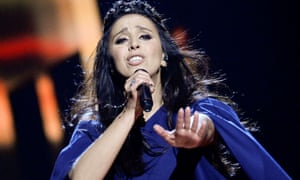"Of course it’s about 2014 as well. These two years [of conflict] have added so much sadness to my life. Imagine, you’re a creative person, a singer, but you can’t go home for two years. You see your grandfather on Skype who is 90 years old and ill, but you can’t visit him. What am I supposed to do: just sing nice songs and forget about it? Of course I can’t do that."
"I know that you sing a song about peace and love, but actually, I really want peace and love to everyone."
"Thank you, Europe – welcome to Ukraine!"
Jamala, Eurovision winner, [Susana Jamaladynova] Crimean Tatar
 |
| Jamala, representing Ukraine, performs the song 1944 during the Eurovision Song Contest semi-final. Photograph: Jonathan Nackstrand/AFP/Getty Images |
"This is partly a consequence of the propaganda war of information that is being waged against Russia."The Crimean Tatars haven't forgotten their persecution by Stalin, forcing them out of their native Crimea. And while the overwhelming numbers of Ukrainians of Russian descent in the east of Ukraine supported previous president Viktor Yanukovych, a puppet of Russia, outraged when a popular uprising in Kiev threw him out of office, leaving them to mount a violent offensive against the new regime, the Crimean Tatars resisted that uprising. They remain persecuted now, seen as traitors by the ethnic Russians agitating for sovereignty.
"There is a general demonisation of Russia – that we are all evil, that our athletes are doping, that our planes violate airspace."
Russian MP Elena Drapeko
When Russian President Vladimir Putin furtively moved his military forces and equipment into eastern Ukraine to take re-possession of the Crimean Peninsula, his original intention was no doubt not to stop with Crimea, but to gain possession for Mother Russia of the east of Ukraine as well. He obviously overlooked the possibility that the international community would be moved to outrage at his re-enactment of imperialistic Soviet-style aggression.
Russia's difficulties in recognizing Ukraine as a separate, sovereign country to be respected as a neighbour whose borders were not to be breached let alone moved to suit the Russian Federation's acquisitive streak of belligerent bullying, no doubt owes to the history between the two countries where in the past Russia thought of Ukraine as Russian territory and treated it as such. During the years of the USSR, the fiction that captive countries were loyal and loving Russian citizens was maintained through intimidation and force.
Once Soviet Russia lost its will to carry on the legend of Russian protectiveness toward its helpless neighbours through a lens of pretense-equality within the USSR and ongoing support for Russian entitlement to administer the affairs of the restive conglomerate, the various countries that comprised the whole found their salvation in a weak Russia unable to maintain the steel bonds that kept them in thrall to Russian ambition and happily decamped, leaving Russia bitter at the betrayal of their fond largesse.
Ukraine, of course, has not been the only casualty of a still-grasping Russia determined to reforge those bonds. There is also the government of Moldova with its armed standoff with Russia-backed separatists and Georgia which has gone through its violent military show-down with Russia, in the process losing two of its provinces. Ukraine's Donbass region where the Donetsk and Luhansk 'People's Republics" were established by ethnic Russian separatists in Ukraine continue to contest the federal government.
Despite international sanctions that have helped Russia into a recession, along with the plunge of oil prices thanks to Saudi Arabia's willingness to take a financial hit to beggar the Islamic Republic of Iran, Russian President Putin remains adamant that Crimea will not be returned to Ukraine. His determination is more than matched by that of Ukrainian President Petro Poroshenko's insistence that Crimea belongs to Ukraine and must be returned; a position echoed by the international community.
The military checkmate that exists between the Ukrainian government and its separatist challengers appears to be going nowhere in a hurry. The Kremlin's lowered profile owes much to Mr. Putin's decision to step into the Middle East fray in support of the Syrian tyrant who has been busy using his military might to stamp on the human rights of his own civilian Syrian Sunnis, considering them all rebels supporting the Sunni rebellion against his Alawite Shiite rule.
And yes, to the contention of Elena Drapeko, the Russian MP, Russian planes are violating the airspace of other nations, in a rude display of audacious challenge that speaks of "what are you going to do about it?" as Vladimir Putin amuses himself by causing consternation to NATO members. While at the same time screaming outrage at NATO's acquiescence to Baltic nations' pleading for support against Russian aggression, and the placement of missile shields in its near neighbourhood.
Labels: Conflict, European Union, NATO, Russia, Ukraine

<< Home